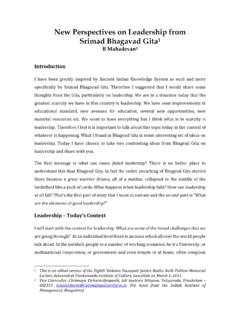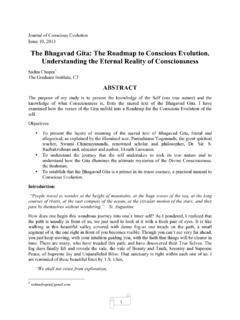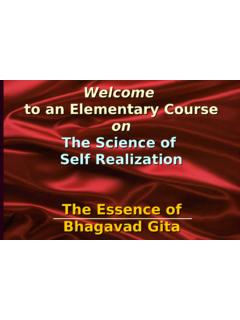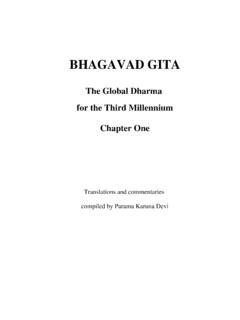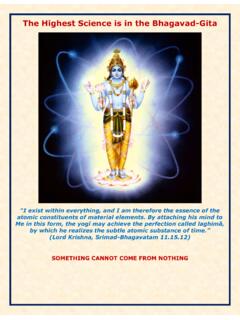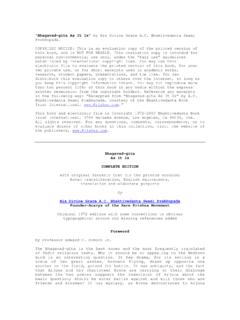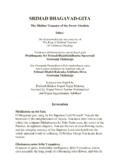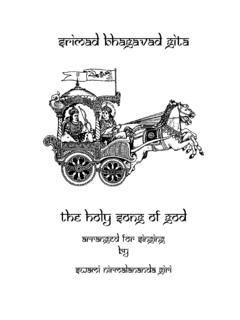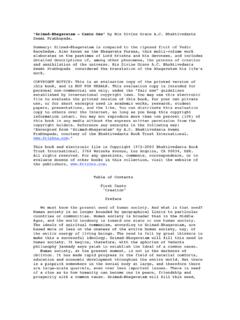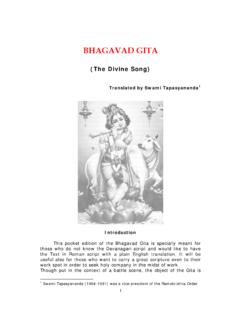Transcription of SRIMAD BHAGAVA D-GITA - Maine Hindu Temple
1 SRIMAD bhagavad -GITAR eferences: is a divine preaching from Lord Krishna to Prince Arjun on the battlefield of Kurukshetra in 3102 ; just prior to the commencement of the Mahabharata war. vThis date corresponds to 1700 years before Moses, 2500 years before Buddha, 3000 years before Jesus and 3800 years before Mohammed. INTRODUCTION sarvopanishadogavodogdhagopalanandana:pa rthovatsa: sudheerbhokthadugdhamgitamrutammahatWord to word meaning:sarva- all; upanishadho Upanishads are; gavo- cows; dogdha- milker;gopalanandana:- (is)the son of the cowherd ,( Krishna); partho- sonof prutha,(Arjuna); vatsa:- (is the)calf; sudhee:- (the)men ofpurified intellect; Bhoktha- (are the)drinkers; dugdham- (and the )milk ; mahat- (is the)supreme; amrutam- nectar; gita- (of) GitaSlokameaning:(If)All upanishadsare (likened to) cows.
2 The milkeris the son ofthe cowherd, Krishna; Arjuna, son of prutha, is the calf; the men ofpurified intellect are the drinkers and the milk is the supremenectar of MAHATMYAvThe bhagavad -Gita consists of 18 chapters. vYoga is the science of the individual consciousness attaining communion with the Ultimate Consciousness. vSo each chapter is a highly specialized yoga revealing the path of attaining realization of the Ultimate Truth. vThe first six chapters have been classified as the Karma Yoga section as they mainly deal with the science of the individual consciousness attaining communion with the Ultimate Consciousness through actions. Chapter1 : VisadaYogaChapter 2 : SankhyaYogaChapter3 : Karma YogaChapter 4 : JnanaYogaChapter 5 : Karma VairagyaYogaChapter 6 : AbhyasaYogaKARMAYOGAvThe middle six chapters have been designated as the Bhakti Yogasection as they principally are pertaining with the science of the individual consciousness attaining communion with the Ultimate Consciousness by the path of 7 : ParamahamsaVijnanaYogaChapter 8 : Aksara-ParabrahmanYogaChapter 9 : Raja-Vidya-Guhya YogaChapter 10 : Vibhuti-Vistara-YogaChapter 11 : Visvarupa-DarsanaYogaChapter 12.
3 Bhakti YogaBHAKTI YOGAvThe final six chapters are regarded as the JnanaYoga section as they are primarily concerned with the science of the individual consciousness attaining communion with the Ultimate Consciousness through the : Ksetra-KsetrajnaVibhagaYogaChapter 14 : Gunatraya-VibhagaYogaChapter 15 : PurusottamaYogaChapter 16 : Daivasura-Sampad-VibhagaYogaChapter 17 : Sraddhatraya-VibhagaYogaChapter 18 : Moksa-OpadesaYogaJNANAYOGAvChapter one introduces the scene, the setting, the circumstances and the characters involved determining the reasons for the bhagavad -Gita's scene is the sacred plain of Kurukshetra. The setting is a battlefield. The circumstances is war. vThe main characters are the Supreme Lord Krishna and Prince Arjuna, witnessed by four million soldiers led by their respective military commanders.
4 VAfter naming the principal warriors on both sides, Arjuna s growing dejection is described due to the fear of losing friends and relatives in the course of the impending war and the subsequent sins attached to such actions. vThus this chapter is entitled: Lamenting the Consequence of 1- VISHADAYOGAvVerse 1:||||1||dh itar htrauv cha:dharma-k hetrekuru-k hetresamavet yuyutsava m mak p av hchaivakimakurvatasa jayadh itar htra uv cha Dhritarashtrasaid;dharma-k hetre the land of dharma;kuru-k hetre at Kurukshetra;samavet having gathered;yuyutsava desiring to fight;m mak my sons;p av the sons of Pandu;cha and;eva certainly;kim what;akurvata did they do;sa jaya SanjayCHAPTER 1 HAS 46 VERSES King Dhritarashtra, apart frombeing blind frombirth, was also bereft of spiritual wisdom.
5 His attachment to his own sons made himdeviate fromthe path of virtue and usurp the rightful kingdomof the Pandavas. He was conscious of the injustice he had done toward his own nephews, the sons of Pandu. His guilty conscience worried himabout the outcome of the battle, and so he inquired fromSanjay about the events on the battlefield of Kurukshetra, where the war was to be this verse, the question he asked Sanjay was, what did his sons and the sons of Pandu do, having gathered on the battlefield? Now, it was obvious that they had assembled there with the sole purpose of fighting. So it was natural that they would fight. Why did Dhritarashtrafeel the need to ask what they did?His doubt can be discerned fromthe words he used dharma k hetre, the land ofdharma(virtuous conduct).
6 Kurukshetra was a sacred land. In the ShatapathBrahman, it is described as:kuruk hetra deva yajanam[v1]. Kurukshetra is the sacrificial arena of the celestial gods. It was thus the land that nourisheddharma. Dhritarashtraapprehended that the influence of the holy land of Kurukshetra would arouse the faculty of discrimination in his sons and they would regard the massacre of their relatives, the Pandavas, as improper. Thinking thus, they might agree to a peaceful settlement. Dhritarashtrafelt great dissatisfaction at this possibility. He thought if his sons negotiated a truce, the Pandavaswould continue to remain an impediment for them, and hence it was preferable that the war took place. At the same time, he was uncertain of the consequences of the war, and wished to ascertain the fate of his sons.
7 As a result, he asked Sanjay about the goings-on at the battleground of Kurukshetra, where the two armies had &DISCUSSION
